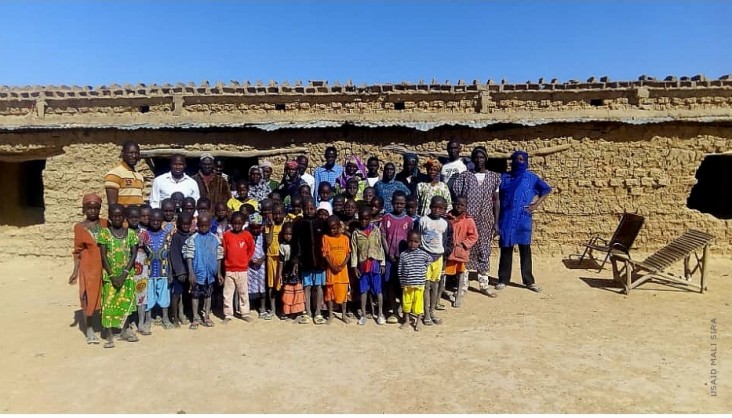Speeches Shim

With its awareness- raising activities that target people from all social classes in the communities, SIRA project helped to bring back to school children from two intervention areas.
March 2019 – Konokassi and Niébébougou are villages located in Niono, Ségou Region. Because of insecurity and threats of physical harm and even death to teachers, schools in these areas were closed on October 1st, 2018, which is the official start date of the school year in Mali. Thus students and teachers stayed at home.
During social negotiation activities with village leaders and the mayor, the USAID Selected Integrated Reading Activity (SIRA) realized that classes had been closed for weeks. The project’s field agents—also known as the community development agents and community facilitators—visited the District Education Office of Niono and the Mayor of Mariko Commune.
They organized awareness-raising meetings in communities, on the themes of the Social Behaviour Change Communication Campaign which takes into account topics such as: the importance of bilingual education in early grades, gender equality between girls and boys with regard to access to and retention in school, and the involvement of parents in children learning to read and write. The SIRA Project field agents also conducted courtesy and outreach visits to community leaders so that they could help motivate parents to send their children to school.
“Now that SIRA Project has contributed to the re-opening of the Konokassi and Niébébougou schools, we are committed to supporting the activities of this project. The development of any area begins with the education of its children”. - Bassey Coulibaly, Mayor in charge of education
After much discussion with the community development agents and the community facilitators, the community understood the importance of reopening schools. Thus, a decision was taken to inform the parents of students to send their children back to school.
With the help of advisory groups representing both the teachers and communities, Bassey Coulibaly, Mayor in charge of education in the area, created a climate of trust to enable teachers to work better in a safe environment. He also invited communities to assume their roles in educating children.
As a result of all these combined efforts, under the leadership of the project’s awareness-raising activities, the two schools were reopened at the end of October 2018. Sassi Samaké, President of the School Management Committee of Konokassi, expressed his satisfaction: “The education of our children concerns us all. The project and the Mayor did their best. We are committed to actively participating in the management and running of our school for the well-being of our children."
Parents of students are equally joyful. Sounkou Samaké testifies: "I am very happy to see my children return to school. With no activities at home, our children wandered the streets.” Adama Sidibé, village chief of Niébébougou, explains: "Since the arrival of the project, parents have been involved in the running of the school. Before, parent and teacher did not discuss about school’s issues. We are proud to see the children of the village return to school."
The SIRA Project continues its activities in these two communities and schools with a student population of 13 including 4 girls in grade 1 in Konokassi and 9 students including 2 girls in grade 2. In Niébébougou, there are 40 students including 16 girls in grade 1 and 28 students including 10 girls in grade 2.
The project, which runs from 2016 to 2021, works to improve reading and writing instruction in the national language of Bamanankan in first and second grades in nearly 4,000 schools in the regions of Koulikoro, Sikasso, Ségou and the district of Bamako.

Comment
Make a general inquiry or suggest an improvement.